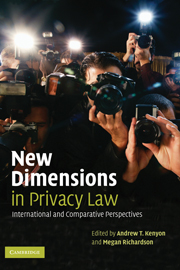Book contents
- Frontmatter
- Contents
- List of contributors
- Preface
- 1 New dimensions in privacy: Communications technologies, media practices and law
- 2 Privacy and freedom of speech
- 3 Revisiting the American action for public disclosure of private facts
- 4 The internet and private life in Europe: Risks and aspirations
- 5 APEC's privacy framework sets a new low standard for the Asia-Pacific
- 6 Copyright, privacy and digital rights management (DRM)
- 7 Why there will never be an English common law privacy tort
- 8 The ‘right’ of privacy in England and Strasbourg compared
- 9 Privacy and constitutions
- 10 Celebrity privacy and benefits of simple history
- Bibliography
- Index
- Index of laws and directives
- Index of case references
2 - Privacy and freedom of speech
Published online by Cambridge University Press: 24 July 2009
- Frontmatter
- Contents
- List of contributors
- Preface
- 1 New dimensions in privacy: Communications technologies, media practices and law
- 2 Privacy and freedom of speech
- 3 Revisiting the American action for public disclosure of private facts
- 4 The internet and private life in Europe: Risks and aspirations
- 5 APEC's privacy framework sets a new low standard for the Asia-Pacific
- 6 Copyright, privacy and digital rights management (DRM)
- 7 Why there will never be an English common law privacy tort
- 8 The ‘right’ of privacy in England and Strasbourg compared
- 9 Privacy and constitutions
- 10 Celebrity privacy and benefits of simple history
- Bibliography
- Index
- Index of laws and directives
- Index of case references
Summary
Introduction
There is a vast amount of literature both on privacy and on freedom of speech and of the press as discrete constitutional and legal rights. Moreover, the relationship between them has been explored in a number of books and law review articles. But now the advent of novel electronic technologies for communication gives a fresh impetus to the discussion and invites reconsideration of a familiar theme. Simply stated, this theme is that privacy rights and interests inevitably conflict with the right to freedom of speech (or expression). A standard argument is that the right to control the dissemination of personal information may be trumped by the interest of the public in knowing private, even intimate, facts about politicians, public officials, or celebrities, because the public has a right to know the truth about such people. On the other hand, it can be contended that freedom of speech does not even cover private gossip, since gossip is not worthy of protection under any clause guaranteeing the right to free speech. And even if freedom of speech does cover the disclosure of private or personal information, it does not protect it from legal action in every case; the two rights or interests have to be balanced and weighed in the context of the particular facts. The point is that there is always a clash of rights, which must be resolved either in favour of the privacy right or of the right to freedom of speech.
- Type
- Chapter
- Information
- New Dimensions in Privacy LawInternational and Comparative Perspectives, pp. 11 - 31Publisher: Cambridge University PressPrint publication year: 2006
- 23
- Cited by

